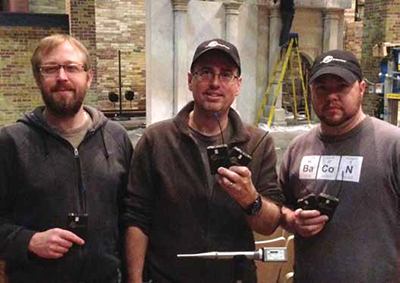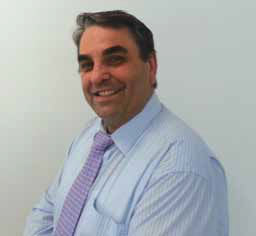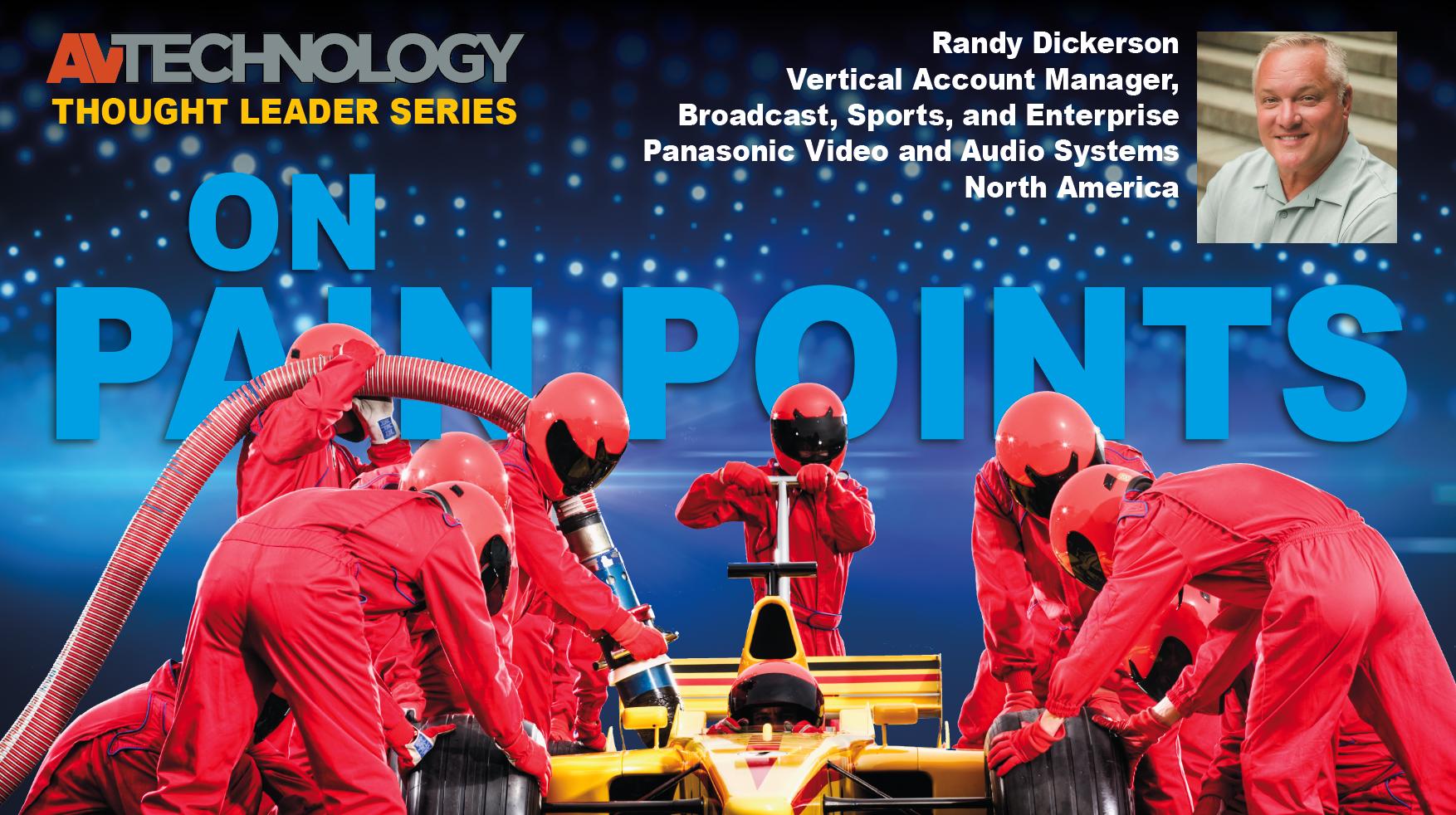11 Ways Tech Managers Can Make AV Departments More Efficient

A daily selection of features, industry news, and analysis for AV/IT professionals. Sign up below.
You are now subscribed
Your newsletter sign-up was successful
Located outside of Atlanta, First Baptist Church Snellville is a Southern Baptist "church on the go." In their sanctuary that seats approximately 1,500 people, the two weekly Sunday services attract an average of 900 to 1,000 worshippers each. Andy Terrell serves as First Baptist Church Snellville’s media director. With a tenure that dates back eight years, Terrell started at the church as the house audio engineer. He knows what it takes to ensure a high level of speech intelligibility, and he has chosen to outfit the First Baptist Church Pastor with the B2D Directional Lavaliere from Countryman Associates. AV technology managers are busier than ever, trying to meet all of their clients’ demands while managing staff, resources and staying within budget. This is why the old adage, “work smarter, not harder,” is one worth applying to your department. By “smarter,” we means finding ways to do your job more effectively, in less time, and with fewer headaches for your, your staff, and your clients.
These 11 steps may not be applicable to all departments or all managers, but the general guidelines might prove to be a helpful road map to increase efficacy in AV departments near and far.
#1 Prioritize
Let’s face it: There will always be more work to do than can be done in your busy day. The trick is to figure out what matters most, and do it first. Though many claim to be expert multi-taskers, trying to do 10 tasks at once is relatively impossible.
In other words, “Prioritize, prioritize, prioritize,” stated Tracy Bathurst, ListenPoint Product Group Leader with Listen Technologies Corporation. “We all waste time on tasks that do not move us toward the end result,” Bathurst said. “The trick is to minimize them and move them to the back of the list as much as possible.“
Here’s an effective way to prioritize your work: Write up a Must-Do List each and every day, with the most important items getting top priority. If you find this hard to do, start by brainstorming the items you need to get done, and writing each of them down as they come to you. Once you’ve got them all out of your head, number them by importance, and presto: An Instant Must-Do List.
When faced with a number of equally important tasks, “Make sure you understand the dependencies and focus on tasks that move toward the end goal as quickly as possible,” Bathurst advised. “Many times a secondary task will lose its importance and may not need to be done if the main objective is reached quickly.”
A daily selection of features, industry news, and analysis for tech managers. Sign up below.
#2 The Best Quarterbacks Are Team Players
You’re in charge of the department, but without the active support of your colleagues and staff, you may not achieve as much. Being a team player is key. This doesn’t mean that every person on staff has to adore you; it means looking out for the best interests of everyone and the group, and pitching in to help when they need it. If there is a particularly inefficient team member in your department, don’t let it affect or distract you. Resorting to gossip won’t solve the problem, either. Consider a revised delegation plan to optimize team strengths. Clarify communication even further. You can even use the unsavory opportunity to showcase how well you handle complex situations. High professionalism in every aspect of your job will show that you are fair and can be trusted. Hopefully it will also set a standard for your colleagues.
Think of yourself as the team quarterback. You can throw the ball, but without other motivated players to catch it, and to keep you from being pummeled by the opposition, you’re nowhere. A stronger team will always get more done.
Jeff Cummings is the production manager at the Young People’s Theatre in Toronto, Ontario. In addition to overseeing all company productions, he is also responsible for facility management, equipment procurement, and heads the organization’s rental operation. Cummings says that he relies on Lectrosonics wireless products for reliable sound quality in every performance. Taking the guesswork out of the equipment process can save valuable time. (Pictured above, from left to right): Michael Laird, Sound Designer; Jeff Cummings, Production Manager; Aiden Nagle, Head of Audio.#3 Take Command

Taking command of your post means taking full responsibility for your departmental goals and obligations. It also means not leaving loose ends for other people to magically tie up.
To be an effective commander, you need to understand the strategy of the organization you are commanding. So learn your company’s mission statement, directives, and long-term objectives, so that you can run your own department in line with them. Not only will this ensure that your actions complement the corporate line—but you’ll be psychologically prepared to grow with your employer, and improve your chances for moving up the corporate ladder.
#4 Communicate Effectively
If an AV manager gives vague, unclear, and cursory instructions to her or his team, there is no way to guarantee or standardize project results. This is why AV managers must do their very best to speak clearly, concisely, and intelligibly about not just immediate tasks, but also the bigger picture goal. This may seem like an obvious point, but during the busiest times of the week/month/year, clear communication sometimes takes a back seat.
“Make sure that every effort is made to communicate and assure an understanding of the reason for the task being requested or performed, its value to the customer, the company, the team, and the relationships involved,” advised Steve Woolley. He is a Wireless Listening Product Group Leader at Listen Technologies Corporation. “Communicate how each task is related to others’ work, and vice versa,” Woolley added. “This builds teams and relationships, and links people to overall success and willing sharing of responsibilities.”
#5 Set An Example: Own Your Mistakes
Everybody gets it wrong sometimes, including the manager. How you handle mistakes will set a constructive example for your colleagues and staff.

The California Polytechnic State University Journalism Department forged a “partnership in education” with JVC to help create a more effective and dynamic environment for students and staff. If you make a mistake and then blame it on others, your staff will follow your lead. Unfortunately, this will minimize the chances for mistakes to be properly identified and fixed, and for new procedures to be developed to prevent the same mistakes occurring again.
So be accountable for your actions, and admit where the workflow could be improved, honestly and maturely—when/if the occasion calls for it. This will encourage your staff to follow suit, allowing you not to waste time when things go wrong by sorting through a windstorm of “he said/she said.”
Accountability helps build trust; it shows that you are strong enough to take feedback and grow in the right ways.
#6 Keep Your Equipment Properly Maintained
Managing your AV technology properly means ensuring that every piece of equipment you use is properly maintained, carefully used, and lovingly repacked/stored every time, if applicable.
Of course, AV tech often gets knocked about on rental or traveling jobs. This is why you should “Test all your equipment when it returns from a show thoroughly,” said Domenico Carrera, Managing Director, Carrera Concepts Pty Ltd in Robina, Australia. As well, “invest in good quality portable video test pattern gear as well as handheld audio test devices,” Carrera noted. The problems you detect and solve early by using such equipment will save you tremendous grief later in the year.
#7 Forge Smart Partnerships


Left: Steve Woolley, Wireless Listening Product Group Leader, Listen Technologies Corporation Right: Tracy Bathurst, ListenPoint Product Group Leader, Listen Technologies Corporation. The California Polytechnic State University (Cal Poly) Journalism Department in San Luis Obispo, California and JVC Professional Products Company formed a “partnership in education” that helps Cal Poly work smarter.
In 2012, the school acquired 10 JVC GY-HM150 ProHD compact handheld camcorders, which students use for their coursework as part of Cal Poly’s hands-on, “learn by doing” educational philosophy.
Professor Richard Gearhart, also a well-known news anchor at KSBY, the NBC affiliate in San Luis Obispo, helped foster the relationship.
“This partnership with JVC enables us to educate students using equipment that they will encounter in the journalism profession when they enter it,” added Harvey Levenson, interim chair of the Journalism Department and head of the Graphic Communication Department.
Gearhart said the new ProHD cameras are part of a migration to full HD production and a file-based workflow for Cal Poly. “Commercial news operations are using tapeless formats,” he noted, “so we need to have our students learn what is standard in the industry.”
#8 Get the Most Out of Your Current Tools
AV tech managers at Cal Poly appreciate their new AV gear, but where budgets are tight, a sensible strategy is to optimize the tools you already have. Learn just how much your existing equipment can do for you. Chances are you may be surprised by the undiscovered capabilities you have at hand.
“There are so many tools available with smartphones, tablets, and computer that we only use a small portion of,” said Tracy Bathurst. “There are numerous tools that we already have or that are freely available that can help organize, track, and improve our effectiveness. Learn the capabilities and how to get the most out of them.”
#9 Take a Minute to Save an Hour
The problem with being busy is that we can lose perspective. We get so engrossed with working hard that we don’t take the time to step back and find better ways to work smart.
One solution: Take a minute to save an hour. In other words, “Devote five to ten percent of your week to efficiency improvements,” said Bathurst. “Look at where the most time is wasted, and spend a few hours figuring out how it can be done more efficiently.” , but eliminating wasted effort will pay off in the long run.
And yes, it may be tough to find the time to save the time. But all the more reason to make little tweaks in the department now for potential longterm benefit.
Domenico Carrera, Managing Director, Carrera Concepts Pty Ltd#10 Rethink the Structure of Departmental Meetings

It’s a cliché for a reason—most professionals would avoid meetings if given the option, and for good reason. So much time can be wasted sitting around a table talking for hours, only to have nothing to show for it.
Systems Contractor News editor Kirsten Nelson has a solution for this problem: The Japanese meeting management technique known as PechaKucha.
Translated into English as “Chit Chat,” PechaKucha speeds up meetings by insisting that presenters follow the “20x20 format.” Nelson explained that speakers have 20 slides which are each shown for 20 seconds, advancing automatically so no one can pretend they forgot how much time has passed.
As radical as PechaKucha sounds, it works. With any luck, you may even enjoy the meeting.
Kevin Handerson, Director, Middle Atlantic Products#11 Keep Learning, and Help Others Learn

Related to the idea of taking command, you cannot be an effective leader if you do not stay up-to-date. So buckling down, logging study hours, and securing the necessary technology or management certifications will keep you ahead of the curve. Make sure that your staff have the same opportunities to stay current: It will pay off with them being able to provide the very best service to your organization’s end-users. Securing funds for team-wide InfoComm CTS certifications, for example, is one way to show your department that you want to invest in their skill-sets and longevity.
A final note: Learning covers the small things as well as the big things. A case in point: “Teach everyone in your company how to roll up cables,” said Carrera. “You would not believe how many times I have had to add another lead into a show with only five minutes’ notice, and the joy I have when I throw a 20-30 foot lead and it uncoils perfectly.”
James Careless is a freelance writer based in Ottawa, Canada. He regularly contributes to AV Technology, Streaming Media, and Radio World.
Advice for AV Managers
by Kevin Handerson
How busy were you this week? Very busy, I expect. How about last week? I expect you were also busy last week too. Here’s the harder question for most managers: What did you really accomplish this week?
The truth is, being very busy as a manager doesn’t always mean that you accomplished very much. Oh, yes, you kept things moving. You responded to a huge number of emailed requests and questions. You attended several important meetings. Perhaps you sent off a memo or two. The truth is, if that’s what you accomplished this week, then your days are probably numbered. And if your company hasn’t let you know this, then your company’s days are probably numbered too. That’s not what your company—or really, the world—needs from you.
What the world needs from you is leadership and effectiveness. Competition—and I mean real, global, major league competition—is not just an idea. It’s reality for every industry, every region, every marketplace. Not in the future—right now. If your company doesn’t have a winning strategy and a winning execution, then your company doesn’t have a future. No matter what your function is, you need to add value to that winning position. How do you do that?
I’m sure there are many ways to do it, and I cannot presume to tell you what your winning strategy should be. I can say, though, that keeping an eye on your higher-level goals is very likely a part of the answer. If you don’t already know a way to be more successful with those higher-level goals, here’s a suggestion: go to your favorite web search engine and look up “the urgent/important matrix.” Read several of the linked entries until you see the pattern, and pick the entry that seems to speak to you most clearly. Print out that entry, and put the printout in your top desk drawer. Read it every morning until it becomes a part of your way of life.
The nice thing about this action is that it is a “win-win.” The more managers in the world that take heed of this advice, the better. The more you are able to focus and prioritize on the most important matters, the more effective and efficient you will be—and that carries through to your staff, and to nearly everyone around you. The only folks that will be unhappy will be those that fill their time with urgent, but unimportant, tasks and objectives. Disappointing these people must not slow you down—the stakes are too high, and life is too short to devote your limited time that way.
Thank you for your consideration, and best of luck!
Kevin Handerson is the director of Middle Atlantic Products (middleatlantic.com).
James Careless is an award-winning freelance journalist with extensive experience in audio-visual equipment, AV system design, and AV integration. His credits include numerous articles for Systems Contractor News, AV Technology, Radio World, and TV Tech, among others. Careless comes from a broadcasting background, with credits at CBC Radio, NPR, and NBC News. He currently co-produces/co-hosts the CDR Radio podcast, which covers the Canadian defense industry. Careless is a two-time winner of the PBI Media Award for Excellence.

